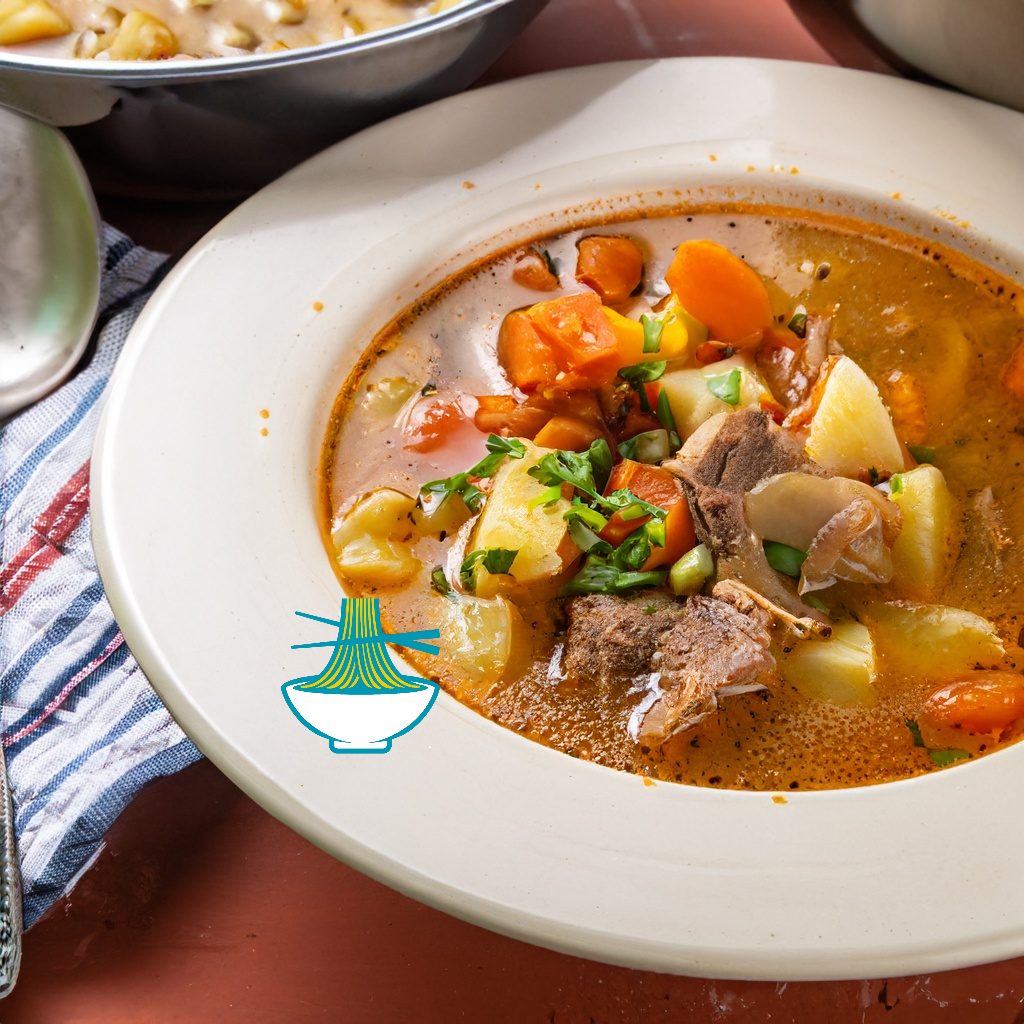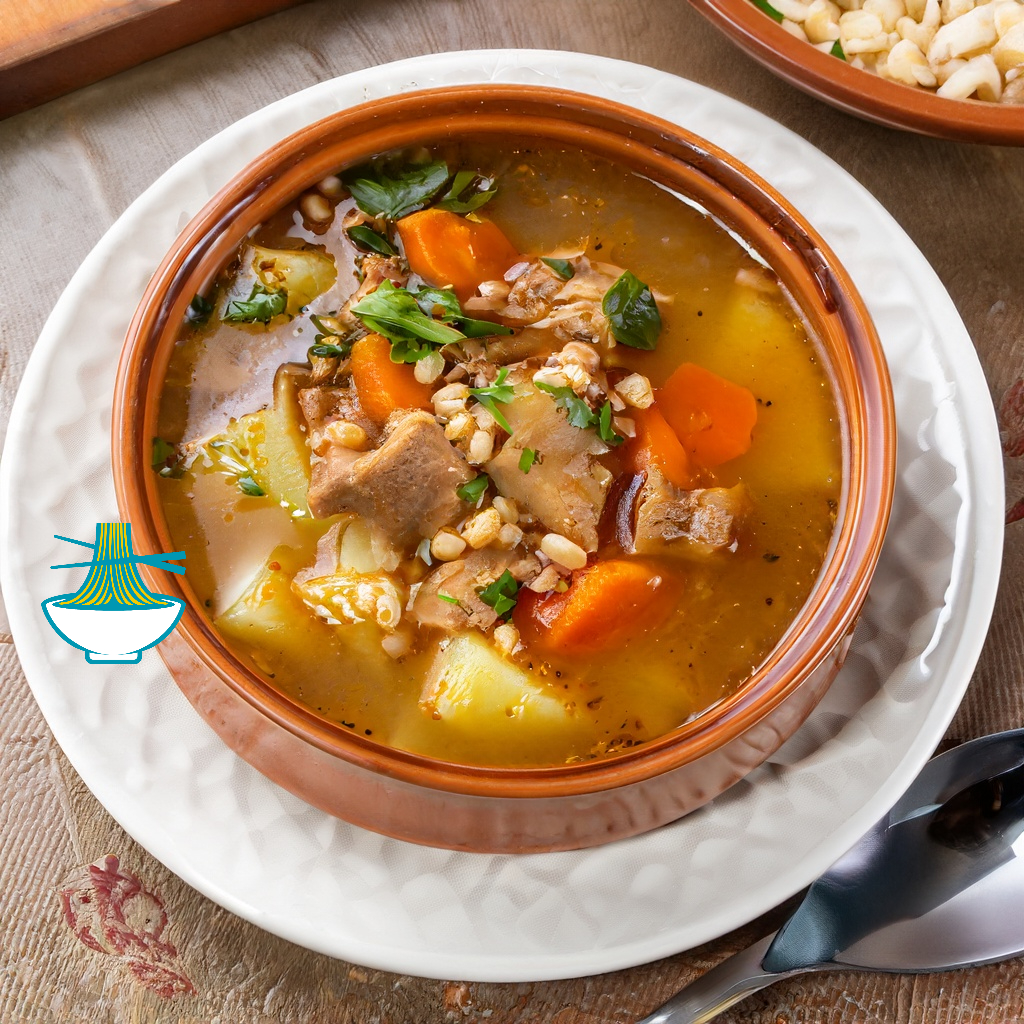Authentic Algerian Chorba Frik is a traditional soup that embodies the essence of North African cuisine. Known for its rich, hearty flavors, this comforting dish is particularly enjoyed during Ramadan and colder months. Made with lamb, vegetables, and frik (cracked green wheat), it is seasoned with aromatic spices such as coriander, cumin, and turmeric. The inclusion of frik adds a unique smoky flavor, making it stand out among other soups. Beyond its delicious taste, Chorba Frik is packed with essential nutrients, offering a good source of protein, fiber, and vitamins like vitamin C, B vitamins, and iron. This recipe has been a symbol of nourishment and warmth for generations, fostering a sense of community, especially when shared with family and friends. Its rich nutritional profile makes it not only comforting but also beneficial for maintaining energy levels and supporting overall health.
Ingredients:
1- 500g lamb meat, cut into cubes
2- 2 large onions, chopped
3- 2 tablespoons olive oil
4- 1 tablespoon tomato paste
5- 1 teaspoon ground coriander
6- 1 teaspoon ground cumin
7- 1 teaspoon paprika
8- 1/2 teaspoon turmeric
9- Salt and pepper to taste
10- 1 cup frik
11- 1 large carrot, chopped
12- 1 large potato, chopped
13- 1/2 cup chopped celery
14- 1/2 cup chopped parsley
15- 2 liters water
Ingredient Substitutions:
- While lamb is the traditional choice for Chorba Frik, there are several options for substitutions depending on dietary preferences or availability:
- Chicken: A leaner alternative, chicken can replace lamb for a lighter version of the soup. Use chicken thighs or breasts for the best flavor.
- Vegetarian Option: For a plant-based version, use vegetable broth instead of meat stock. Substitute the lamb with tofu, tempeh, or mushrooms to mimic the texture and heartiness of the original soup. Adding extra vegetables like zucchini, bell peppers, or eggplant can enhance the dish.
- Beef: For those who prefer red meat but want a different flavor, beef is a suitable alternative. Be sure to adjust the cooking time to ensure tenderness.
Instructions:
1- In a large pot, heat the olive oil over medium heat. Add the onions and sauté until they are soft and translucent.
2- Add the lamb cubes to the pot and brown them on all sides.
3- Add the tomato paste, coriander, cumin, paprika, turmeric, salt, and pepper to the pot. Stir to coat the lamb and onions in the spices.
4- Add 2 liters of water to the pot and bring it to a boil.
5- Reduce the heat to low and add the frik, carrot, potato, celery, and parsley to the pot.
6- Cover the pot and let the soup simmer for 1 to 2 hours, until the lamb is tender and the vegetables are cooked through.
7- Serve hot, garnished with additional parsley if desired.
Serving Suggestions for Chorba Frik:
- Chorba Frik is best served hot, making it a comforting meal during colder months or special occasions like Ramadan. To elevate the dining experience, consider garnishing the soup with fresh herbs such as parsley or cilantro. You can also serve it with crusty bread or flatbread to soak up the rich broth. For a more complete meal, pair it with a light salad made of fresh vegetables, or enjoy it as a starter before a main dish. For a traditional touch, serve with dates or olives on the side, which complement the warm, savory flavors of the soup.
Note:
- You can adjust the amount of water in the recipe depending on how thick you like your soup. You can also substitute chicken or beef for the lamb if you prefer.
Frequently Asked Questions:
Can Chorba Frik be stored?
- Yes, you can store Chorba Frik in the refrigerator for 2-3 days or in the freezer for up to 3 months. Make sure to store it in an airtight container to prevent it from absorbing other odors in the fridge.
How can I prepare Chorba Frik for vegetarians?
- To make a vegetarian version, simply substitute vegetable broth for the meat stock and replace the lamb with plant-based protein like tofu, tempeh, or mushrooms. You can also add more vegetables to enhance the flavor and texture.
Is Chorba Frik suitable for people on a diet?
- Yes, Chorba Frik is a great option for a balanced diet. It is high in fiber, which helps with digestion and weight management. The lamb provides quality protein, and the vegetables offer essential vitamins and minerals.
Are there any specific health benefits for children or the elderly?
- Chorba Frik is packed with nutrients that are beneficial for children and seniors. The iron in the lamb helps prevent anemia, while the calcium in the vegetables contributes to bone health. The vitamins in the soup also support immune function and overall well-being.
Can I prepare Chorba Frik in different ways?
- Absolutely! You can adjust the recipe to suit your taste preferences. Add seasonal vegetables like zucchini or eggplant, or experiment with different spices. You can also adjust the thickness of the soup by altering the amount of water or frik used.

Nutrition Facts (per serving):
- Calories: 350
- Fat: 18g
- Saturated Fat: 5g
- Cholesterol: 90mg
- Sodium: 600mg
- Carbohydrates: 22g
- Fiber: 4g
- Sugar: 4g
Here are the nutrition facts for the ingredients used in Chorba Frik:
500g lamb meat, cut into cubes:
- Calories: Approximately 1060 kcal
- Fat: Approximately 80g
- Protein: Approximately 90g
- Carbohydrates: Approximately 0g
benefits:
- Protein: Lamb is rich in high-quality protein, essential for muscle growth and repair.
- Vitamins and Minerals: It provides important nutrients like iron, zinc, and B vitamins, particularly B12, which support red blood cell formation and energy metabolism.
2 large onions, chopped:
- Calories: Approximately 100 kcal
- Fat: Approximately 0g
- Protein: Approximately 2g
- Carbohydrates: Approximately 22g
benefits:
- Antioxidants: Onions are high in antioxidants, including quercetin, which help fight inflammation and protect against chronic diseases.
- Digestive Health: They contain fiber, which aids in digestion and promotes a healthy gut.
2 tablespoons olive oil:
- Calories: Approximately 240 kcal
- Fat: Approximately 28g
- Protein: Approximately 0g
- Carbohydrates: Approximately 0g
benefits:
- Healthy Fats: Olive oil is a good source of monounsaturated fats, which are heart-healthy and can reduce bad cholesterol levels.
- Antioxidant Properties: It contains antioxidants like vitamin E and polyphenols, which help protect cells from damage.
1 tablespoon tomato paste:
- Calories: Approximately 13 kcal
- Fat: Approximately 0g
- Protein: Approximately 0g
- Carbohydrates: Approximately 3g
benefits:
- Lycopene: Tomato paste is rich in lycopene, a powerful antioxidant that may reduce the risk of certain cancers and heart disease.
- Vitamins: It provides vitamins C and K, potassium, and folate.
1 teaspoon ground coriander:
- Calories: Approximately 5 kcal
- Fat: Approximately 0g
- Protein: Approximately 0g
- Carbohydrates: Approximately 1g
benefits:
- Anti-inflammatory: Coriander has anti-inflammatory properties that can help reduce swelling and pain.
- Digestive Aid: It aids in digestion and can help alleviate symptoms of indigestion.
1 teaspoon ground cumin:
- Calories: Approximately 8 kcal
- Fat: Approximately 0g
- Protein: Approximately 0g
- Carbohydrates: Approximately 1g
benefits:
- Iron Source: Cumin is a good source of iron, essential for red blood cell production and preventing anemia.
- Digestive Health: It aids in digestion and can help improve gut health.
1 teaspoon paprika:
- Calories: Approximately 6 kcal
- Fat: Approximately 0g
- Protein: Approximately 0g
- Carbohydrates: Approximately 1g
benefits:
- Vitamin A: Paprika is rich in vitamin A, which is important for vision, immune function, and skin health.
- Antioxidants: It contains antioxidants that help protect against cellular damage.
1/2 teaspoon turmeric:
- Calories: Approximately 3 kcal
- Fat: Approximately 0g
- Protein: Approximately 0g
- Carbohydrates: Approximately 1g
benefits:
- Anti-inflammatory: Turmeric contains curcumin, a compound with powerful anti-inflammatory and antioxidant effects.
- Heart Health: It may help improve heart health and reduce the risk of heart disease.
Salt and pepper to taste:
- Nutritional information depends on the amount used. These are usually low in calories, fat, and carbohydrates.
benefits:
- Flavor Enhancement: Salt and pepper enhance the flavor of the dish.
- Electrolytes: Salt provides essential electrolytes, but should be used in moderation to avoid health issues like high blood pressure.
1 cup frik:
- Calories: Approximately 700 kcal
- Fat: Approximately 5g
- Protein: Approximately 20g
- Carbohydrates: Approximately 150g
benefits:
- Fiber: Freekeh is high in fiber, which aids in digestion and helps maintain a healthy weight.
- Protein: It is a good source of plant-based protein, making it a nutritious grain option.
1 large carrot, chopped:
- Calories: Approximately 50 kcal
- Fat: Approximately 0g
- Protein: Approximately 1g
- Carbohydrates: Approximately 12g
benefits:
- Beta-Carotene: Carrots are rich in beta-carotene, which the body converts to vitamin A, important for vision and immune health.
- Antioxidants: They contain antioxidants that help protect against chronic diseases.
1 large potato, chopped:
- Calories: Approximately 150 kcal
- Fat: Approximately 0g
- Protein: Approximately 4g
- Carbohydrates: Approximately 36g
benefits:
- Carbohydrates: Potatoes provide a good source of energy through their carbohydrate content.
- Vitamins and Minerals: They contain vitamins C and B6, potassium, and fiber.
1/2 cup chopped celery:
- Calories: Approximately 8 kcal
- Fat: Approximately 0g
- Protein: Approximately 0g
- Carbohydrates: Approximately 2g
benefits:
- Low Calorie: Celery is low in calories and high in water content, making it a hydrating and diet-friendly food.
- Vitamins and Minerals: It provides vitamins A, K, and C, as well as folate and potassium.
1/2 cup chopped parsley:
- Calories: Approximately 10 kcal
- Fat: Approximately 0g
- Protein: Approximately 1g
- Carbohydrates: Approximately 2g
benefits:
- Vitamins and Antioxidants: Parsley is rich in vitamins A, C, and K, and contains antioxidants that help reduce inflammation.
- Bone Health: It provides vitamin K, which is important for bone health.
2 liters water:
- Calories: 0 kcal
- Fat: 0g
- Protein: 0g
- Carbohydrates: 0g
benefits:
- Hydration: Water is essential for maintaining hydration and ensuring the proper function of all bodily systems.
- Cooking Medium: It helps to cook and soften the ingredients, blending their flavors together.
Additional Health Benefits:
Chorba Frik is not only a flavorful meal but also offers numerous health benefits, thanks to its nutrient-rich ingredients:
- Lamb: Rich in high-quality protein, lamb helps with muscle growth and repair. It's also an excellent source of essential vitamins and minerals like iron, zinc, and vitamin B12, which support red blood cell production and energy metabolism.
- Frik (Cracked Green Wheat): A whole grain, frik is high in fiber, which promotes digestive health and helps regulate blood sugar levels. It is also rich in antioxidants, which protect cells from damage.
- Vegetables: Ingredients like carrots, potatoes, and onions provide vitamins A, C, and B6, which are important for immune function, skin health, and energy production. Carrots, rich in beta-carotene, support good vision, while potatoes offer a great source of carbohydrates for sustained energy.
- Spices: Turmeric, cumin, and coriander are not only flavorful but also known for their anti-inflammatory properties. Research suggests that turmeric, in particular, has powerful effects on reducing inflammation and supporting heart health.
Please note that the nutrition facts may vary depending on various factors such as the specific brands of ingredients used and the cooking methods employed. These values are approximate and should be used as a general guideline.


Comments